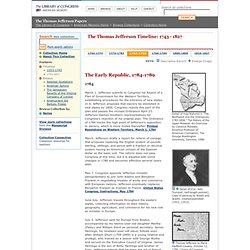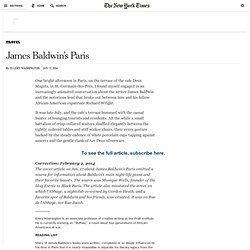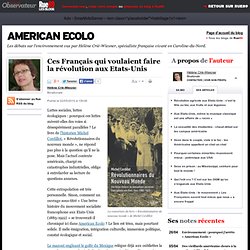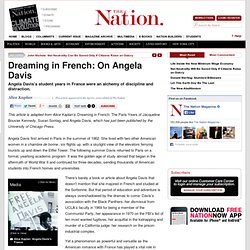

The French Far-Right Isn’t Scary Anymore and That’s the Problem. Marine Le Pen, leader of the French far-right. The big winner in France today. Like it or not, France is a country where the far-right has its say. Prison. TO JEAN PIERRE BRISSOT DE WARVILLE - The Works, vol. 5 (Correspondence 1786-1789) Edition: current; Page: [2]Edition: current; Page: [3] 1.

On the original establishment of the several states, The civil code of England, from whence they had emigrated, was adopted. This, of course, could extend only to general laws, and not to those which were particular to certain places in England only. The circumstances of the new states oblige them to add some new laws which their special situation required, and even to change some of the general laws of England in cases which did not suit their circumstances or ways of thinking.
The law of descents for instance, was changed in several states. I have heard that Connecticut undertook a like work: but I am not sure of this, nor do I know whether any other of the states have or have not done the same. 2. 3. To Thomas Jefferson from Brissot de Warville, 10 February 1788. Paris ce 10 fevrier 1788.

No. 11. rue St. ITINERARY AND CHRONOLOGY OF THOMAS JEFFERSON 1786–1789 - The Works, vol. 5 (Correspondence 1786-1789) The Thomas Jefferson Papers - 1743 to 1827 Timeline - (American Memory from the Library of Congress) March 1.

Jefferson submits to Congress his Report of a Plan of Government for the Western Territory, establishing procedures for the entrance of new states. In it, Jefferson proposes that slavery be abolished in new states by 1800. Congress rejects this part of the plan and passes the revised Ordinance April 23. James Baldwin’s Paris. Photo One bright afternoon in Paris, on the terrace of the cafe Deux Magots, in St.

-Germain-des-Prés, I found myself engaged in an increasingly animated conversation about the writer James Baldwin and the notorious feud that broke out between him and his fellow African-American expatriate Richard Wright. It was late July, and the cafe’s terrace hummed with the casual banter of lounging tourists and residents. All the while a small battalion of crisp-collared waiters shuffled elegantly between the tightly ordered tables and stiff wicker chairs, their every gesture backed by the steady cadence of white porcelain cups tapping against saucers and the gentle clank of Art Deco silverware. Having spent nearly a decade living in Paris, I’d eaten at Les Deux Magots many times. “It started right here,” Jake said of the dispute between Baldwin and Wright, as our waiter swept away our plates to make space for his forthcoming espresso and my cafe allongé.
Continue reading the main story Slide Show. The Global March on Washington. In response to a call by the writer James Baldwin for his fellow Americans living in Paris to support the civil rights march, more than a hundred people — including the blues musician Memphis Slim and the actor William Marshall — crowded into the club for a meeting.

The atmosphere was electric. Angela Davis interviewed by Julian Bond: Explorations in Black Leadership Series. A Quest to Make Gruff Service in France More Gracious. When the family tried to order food in halting French, the waiter rolled his eyes, Mr.

Riberio said. Later, when a wrong dish was served, an argument ensued over whether it would be changed. “In general, the French can be quite friendly and helpful,” said Mr. Riberio, whose family went on to have a pleasant stay. But the encounter “was a reminder of why they can also have a reputation for being rude,” he said. Goodbye Old World, Bonjour Tristesse. Ferdinando Scianna/Magnum Photos (Paris, 1989) On Friday night, Christian Lacroix offered his homage to Elsa Schiaparelli, but even high fashion couldn’t lift Paris from its low mood.

“Liberté, égalité, morosité,” Le Monde declared. Joie de vivre has given way to gaze de navel. The French are so busy wallowing in their existential estrangement — a state of mind Camus described as “Should I kill myself, or have a cup of coffee?” — that they don’t even have the energy to be rude. France’s Glorious Malaise. Quand les idéalistes français trouvaient asile en Amérique. Les Etats-Unis n’ont pas toujours été le vilain Big Brother de la planète.

Au milieu du XIXe siècle, pour les réfugiés politiques et les utopistes français, l’Amérique était « le dernier refuge du droit et de la liberté ». Un livre étonnant raconte les rêves et les déceptions de « ces enfants errants de la France » : « New York, le dimanche 17 décembre 1871. En plein cœur de Manhattan, des milliers de badauds et de sympathisants se pressent pour voir arriver la procession funèbre organisée en mémoire de trois communards fusillés près de Versailles moins de trois semaines auparavant.En tête du défilé, qui avance précédé d’immenses drapeaux rouges, de nombreux Français sont massés derrière un imposant catafalque.
Le succès de la manifestation est spectaculaire puisque l’on parle de 10 000 participants, les journalistes présents sont interloqués, l’opinion publique américaine choquée. » Ces Français qui voulaient faire la révolution aux Etats-Unis. La couverture du livre « Révolutionnaires du nouveau monde » de Michel Cordillot Luttes sociales, luttes écologiques : pourquoi ces luttes suivent-elles des voies si désespérément parallèles ?

Le livre de l’historien Michel Cordillot, « Révolutionnaires du nouveau monde », ne répond pas plus à la question qu’il ne la pose. Mais l’actuel contexte américain, chargé en catastrophes industrielles, oblige à entrelarder sa lecture de questions annexes. Cette extrapolation est très personnelle. Dreaming in French: On Angela Davis. This article is adapted from Alice Kaplan’s Dreaming in French: The Paris Years of Jacqueline Bouvier Kennedy, Susan Sontag, and Angela Davis, which has just been published by the University of Chicago Press.

Angela Davis first arrived in Paris in the summer of 1962. She lived with two other American women in a chambre de bonne, six flights up, with a skylight view of the elevators ferrying tourists up and down the Eiffel Tower. The following summer Davis returned to Paris on a formal, yearlong academic program. It was the golden age of study abroad that began in the aftermath of World War II and continued for three decades, sending thousands of American students into French homes and universities. About the Author. ‘Dreaming in French,’ by Alice Kaplan. Jackie Kennedy, Susan Sontag, Angela Davis in Paris: Alice Kaplan’s Dreaming in French, reviewed.
Jackie Kennedy, Susan Sontag, and Angela Davis: their Paris years. Skip to next paragraph Recent posts Subscribe Today to the Monitor Click Here for your FREE 30 DAYS ofThe Christian Science MonitorWeekly Digital Edition Q: You follow Jackie Kennedy, Susan Sontag, and Angela Davis through the year each spent in France. Which young woman was most profoundly impacted by her Parisian sojourn?
They were impacted in so many different ways that it’s hard for me to choose. Echappées françaises.